- Home
- Robert J. Harris
Artie Conan Doyle and the Gravediggers' Club
Artie Conan Doyle and the Gravediggers' Club Read online
To Kirsty, Mark, Elspeth and Bea,
the Ormiston Irregulars
Contents
Title Page
Dedication
1. The Adventure of the Haunted Graveyard
2. An Encounter in the Fog
3. Drumbeats in the Night
4. The Mystery of the Unwanted Lodger
5. Interview with a Gravedigger
6. The Return of the Stolen Dead
7. The Puzzle of the Six Names
8. The Episode of the Dangerous Doorway
9. A Word with the Electrical Wizard
10. The Ghost Walks Again
11. The Master of the Black Hound
12. The Meeting of the Fighting Men
13. Concerning Colonel Braxton Dash
14. The Riddle of the Six Hundred
15. Into the Valley of Death
16. The Enigma of the Russian Cross
17. The Affair of the Crimean Soldier
18. The Tale of the Four Companions
19. The Doctor Makes a Deduction
20. The Finding of the Final Grave
21. The Honour of the Light Brigade
22. The Arrival of a Noble Visitor
Author’s Note
Copyright
1. The Adventure of the Haunted Graveyard
Edinburgh, January, 1872
As the winter’s night fell, an icy sea fog crept over Leith then nosed its way up the narrow streets and alleyways of Old Edinburgh. It spread silently over Greyfriars Kirkyard, washing up against the walls of the church and coiling about the trees and gravestones. A distant clock struck ten as two figures, a pair of twelve-year-old boys, made their way cautiously through the murk.
“Arthur Conan Doyle,” declared Artie Doyle. “That’s what it will say on my tombstone, Ham, my full and proper name. And underneath that it will say, He achieved greatness as… as…”
“As what, Artie?” asked his friend Edward Hamilton.
“I don’t know yet, Ham,” Artie confessed. “That will take a bit of finding out.”
Ham’s green plaid jacket was buttoned right up to the neck, his shoulders hunched against the cold.
“I do wish you wouldn’t talk about being dead.” He tugged his cap down over his ears. “I’ve got goosebumps already just from sneaking around this graveyard.”
Artie was also dressed for a winter’s night in a tweed jacket, knee-length woollen trousers, long thick socks and a pair of stout leather boots. He tightened his scarf as he walked among the gravestones.
“Don’t complain,” he chided his friend. “Getting in here turned out to be easier than I thought, what with the lock on the gate being broken.”
“A good thing too,” said Ham. “I’d likely have ripped my britches climbing over it.”
Artie stopped and rubbed his hands together. “Doesn’t that broken lock suggest something to you?”
“It suggests to me that the watchman has been sleeping on the job.”
“That’s true, I suppose,” Artie agreed. “But to me it suggests somebody wanted access to the kirkyard after hours. I wonder how long the lock has been broken.”
“It may not mean anything.” Ham jammed his hands deep into his pockets. “It might have been damaged by accident.”
Artie frowned at his friend. “Look, there’s no point sneaking out of the house in the middle of the night to have an adventure if you keep saying everything’s an accident or a coincidence.”
Ham gave a huff. “I’m sure I didn’t mean to spoil it for you.”
A shaft of moonlight suddenly pierced the drifting fog to illuminate a nearby gravestone. Artie bent down to examine the inscription.
Thomas Docherty, Coal Merchant. Born 1757 – Died 1808. REQUIESCAT IN PACE.
He straightened up and translated the three Latin words at the end. “Rest in peace.” Artie paused thoughtfully. “Ham, do you never wonder what comes after – you know, beyond the grave?”
“I do not,” Ham stated firmly. “I expect I’ll find that out when the time comes and not before.”
“Father Cassidy and the other priests at school talk about it quite a lot,” said Artie. “But I don’t see how they can really know.”
“Well, you can take that up with them, if you please,” said Ham. “Assuming we don’t freeze to death right here.”
Though both boys hailed from Edinburgh, they spent most of the year at Stonyhurst College, a boarding school in Lancashire run by Jesuit priests. They would have been back at school already if the roof of the east wing hadn’t collapsed during a violent December storm, extending their Christmas holiday while repairs were made.
“Keep moving,” Artie suggested. “That will warm you up. And keep your eyes peeled.”
“Peeled? Peeled for what?”
“Well, ghosts for one thing. If we actually saw a ghost that would be proof, wouldn’t it, that something lies beyond?”
Ham shuddered. “Listen, if we run into a ghost, you can ask him all the questions you want about what they do on the other side, what they have for tea and suchlike. Me – I’ll be gone as fast as a hare with its tail on fire.”
“You wouldn’t just leave me here to face a ghost alone, would you?”
“I would,” Ham answered flatly. “It’s not like when I helped you in that fight with the barrow boys. I doubt you can land a punch on a ghost.”
“Well, if we can’t harm them, it stands to reason that they can’t hurt us either.”
“Reason has nothing to do with it,” Ham asserted firmly. “People have been running away from ghosts for hundreds of years and I don’t intend to break with tradition.”
Artie made an exasperated noise and walked on.
Ham hesitated for a moment, then followed. “Of course it might be different if it was a very small ghost, like that wee terrier that died last week.”
“What, you mean Greyfriars Bobby?” said Artie. “The dog that used to sleep here?”
The little terrier was famous throughout Edinburgh and all the newspapers had reported his recent passing.
“That’s right,” said Ham. “He didn’t leave his master’s grave for these past fourteen years. Maybe his ghost is still haunting the place.” He peered all around, as if expecting the little ghost dog to pop right up out of the ground.
“Don’t you think that if he missed his master so badly, he’d hurry to join him in Heaven rather than hanging around this place?” Artie pointed out.
Just then Ham seized his forearm. Artie saw that his friend’s eyes had grown wide with horror and when he followed Ham’s gaze his own heartbeat quickened.
Through the sheets of fog he could just make out a figure standing below the bare, skeletal branches of a hawthorn tree. He grabbed Ham by the shoulder and pulled him down behind the nearest gravestone. They crouched there, raising their heads just enough to peep over the top of the stone.
Shrouded in a grey hood and cloak, the apparition drifted slowly across the churchyard. No face could be seen beneath the shadow of the hood, but the two pale, slender hands clutching the cloak tightly in place gave Artie the impression that the spectre was female. Occasionally it paused by a grave before continuing its progress across the kirkyard.
“The Lady in Grey!” said Ham in a choked whisper. “They say she died a hundred years ago upon hearing the news that the man she loved had been killed in battle. Now she wanders the churchyards of Edinburgh searching for his grave.”
As the cloaked figure drew closer, the two boys shrank down lower behind the gravestone. Keeping as still as stone themselves, they held their breath, counting the seconds as the eerie stranger dri
fted past. At last Artie dared a glimpse and caught sight of her fading into the fog. He stood up.
“Come on, let’s follow.”
Ham held back. “Let her go! For all we know, it might be a demon hiding under that hood.”
“Come on!” urged Artie. “We don’t want to lose her.”
Even as he spoke, a fresh billow of fog rolled over them and the Lady in Grey disappeared in the gloom. Artie strained his eyes until they ached but could see no trace of the ghostly figure.
Turning to Ham, he saw his friend take a bite out of a currant bun.
“Where did that cake come from?” he demanded.
“I always have a cake in my pocket.” Ham brushed crumbs from his collar. “You know, in case of emergencies.”
“Emergencies?” Artie echoed. “I thought you said you ate cake when you were bored. Isn’t this situation interesting enough for you?”
“I also eat when I’m frightened,” said Ham, “and right now I am very, very frightened.”
“Ham, I’m beginning to suspect that whatever mood you’re in, it inclines you towards cake,” said Artie crossly. He plucked the cake out of his friend’s hand and tossed it away.
Ham stared dolefully after the bun as it rolled across the damp ground into the shadow of a tall, marble angel.
“I say, that’s a bit much,” he protested, “snatching a chap’s cake.”
“Ham, half the reason for bringing you along on this adventure was to break you of this cake habit.”
“I still don’t see why you wanted to come here,” Ham said unhappily. “What is it you’re looking for?”
Artie shuffled his feet uncertainly on the dank ground then said, “You know that shady character Benjamin Warren?”
“What, the medical student your mother took in as a lodger? I can’t say I’ve ever noticed anything shady about him.”
“You haven’t observed him the way I have,” said Artie darkly, “sneaking in and out of the house at all hours of the day and night, always acting as if he’s got something to hide. This morning I saw his overcoat hanging in the hallway. And,” he added dramatically, “there was something sticking out of the pocket.”
Ham gaped. “What was it? A dagger? A pistol?”
“It was a piece of paper,” said Artie.
“Oh.” Ham’s shoulders slumped in disappointment.
“I slipped it out and had a look at it, then put it back so he wouldn’t know.” Artie leaned towards his friend and spoke in a low, secretive voice. “It was a list of graveyards all over Edinburgh, and Greyfriars was at the top of the list. Now, if he’s as innocent as you suppose, why would he make a list of graveyards?”
“So he’s interested in graveyards,” said Ham with a shrug. “That’s nothing to get excited about. My Uncle Tully used to wander around Edinburgh visiting all the public statues. He even talked to some of them. His favourite was the statue of Charles II in Parliament Square because—”
“This is not the time or place to blether on about your uncle or Charles II,” Artie interrupted brusquely. “I’m quite sure Warren is up to no good and it’s somehow connected to this graveyard. Now come on!”
He started off through the fog with Ham trailing reluctantly behind.
AARROOOOOOO!
Suddenly, from somewhere in the distance, they heard a terrible howling. It shook the winter air, like a cry of inhuman grief.
The two boys froze in their tracks.
“What was that?” Ham quavered, his round face turning white. “A wolf?”
Artie felt his own blood running cold. “There are no wolves in Scotland any more.”
“Then it must have been some sort of a monster.” Ham’s voice cracked with fear. “I’ve had enough, Artie. I’m getting out of here. Now.” He stumbled off in what he hoped was the direction of the gateway.
Artie had no mind to argue.
“It’s this way,” he said, hurrying after his friend and giving Ham’s elbow a tug to steer him in the right direction.
“I really wish you hadn’t thrown my bun away,” Ham groaned. “I could do with a bit of comfort right now.”
The words were no sooner out of his mouth than he tripped over a small grave marker and pitched forward to land flat on his face.
“Ham, are you all right?” cried Artie, kneeling down beside his friend.
Ham didn’t speak. His eyes were fixed on a muddy patch of ground just beyond the end of his nose. Slowly he pushed himself up.
“Artie, look at this. Look!”
Artie leaned forward and squinted at the marks on the muddy ground. “It looks like an animal’s passed this way,” he gasped.
“Do you suppose…” Ham got to his feet and gazed nervously about him. “Do you suppose it was the ghost of Greyfriars Bobby?”
Artie shook his head in numb disbelief. “No terrier made these marks,” he said breathlessly. “These are the footprints of a gigantic hound!”
2. An Encounter in the Fog
The air in the graveyard seemed to turn even colder. It was shot through with a deep sense of menace, as if the drifting mist might harden about them and trap the boys where they stood. Shivering, Artie and Ham stared warily around.
“A gigantic hound,” Ham repeated in a trembling voice. “I don’t recall the Lady in Grey having a dog, but I suppose she might have.”
“A ghost dog would hardly leave footprints,” said Artie, trying his best to sound unafraid. “It would have to be solid to do that.”
“That’s not much comfort.” Ham stared down at the huge paw marks. “Whatever made these must be a monster.”
“I expect the howling we heard was the same beast.”
“That’s even less comfort,” gulped Ham. “It sounded ravenously hungry.”
Slowly they backed away from the paw prints, darting anxious glances through the fog, expecting at any moment to be pounced on by a slavering beast.
“Which way is the gate?” Ham asked nervously. “I’m all turned around.”
Artie was far from sure, but he was determined to act like a leader.
“This way,” he said and set off along the gravel path to their right.
As they made their way cautiously through the gloom, the tiniest sounds made them jump – a whisper of wind, the creak of a branch. Every time the fog billowed towards them they froze in their tracks, half-expecting a monster to jump out of it.
A large, dark shape now loomed ahead of them.
“What is it?” Ham wondered warily. “A tomb, I suppose, full of skeletons…”
“No, no,” said Artie with a note of relief, “it’s the church.”
Silent and unlit, Greyfriars Kirk looked as black as obsidian in the gloom, but the sight of it was somehow encouraging. The two boys hurried towards it and pressed their hands against the damp stonework like survivors of a shipwreck clinging to a rocky shore.
“Maybe we could go inside and hide out there till morning,” Ham muttered. “I don’t think ghosts and monsters are allowed inside a church.”
“It’s all locked up for the night,” said Artie. Just then his ears caught a new sound. “Shh!” he hissed.
Somewhere among the fog-shrouded tombstones, two men were speaking. It was impossible to make out the first man’s muffled words, but his tone was one of complaint.
The other man’s voice was clear and sharp. “Keep looking, damn you!” he snapped. “You’ll get your share when we find it.”
“Yes, sir,” they heard the other man grunt.
Ham pressed himself against the stone wall, as if trying to work his way into the church by sheer force of will. “Artie, they must be pirates or cutthroats or something,” he breathed. “No decent person would be abroad in a graveyard at this hour.”
“Apart from us, you mean,” whispered Artie, straining his ears to hear more. “At least they sound human.”
Just then they heard a deep, bestial growl that could only have come from the throat of some huge animal.
> “The hound!” choked Artie.
It sounded terrifyingly close.
“For heaven’s sake, let’s get out of here!” pleaded Ham.
Artie needed no persuading. Finding the church had given him his bearings. Seizing Ham by the sleeve, he pulled him down the path to their left. As soon as the gate came into sight they charged towards it. They barged through and left it swinging behind them as they staggered out into the street.
The pounding of their hearts eased as soon as they were clear of the graveyard. The comforting smell of boiled cabbage and the sound of drunken singing wafted from the open window of a nearby tavern. However rough those singers might be, at least they were alive.
Heaving sighs of relief, the boys left the Old Town and headed for the Southside where they both lived. The streets were quiet, with only the occasional horse-drawn cab or wagon rattling down the road. The gas-lit windows in the homes they passed were as cheering as candles on a Christmas tree.
Artie’s spirits rose. “Well, Ham, we survived that adventure. And not only did we see a suspected ghost; we heard criminals at work, confirming my suspicions about Warren.”
“Did either of those men sound like your lodger?”
“No, not really…”
“Then how do we know he’s involved?”
“How do we know he’s not? We can’t prove anything by visiting just one of the graveyards on Warren’s list. The next place was the Grange Cemetery. We’ll go there tomorrow and search for more clues.”
“So your plan then,” said Ham glumly, “is to go on visiting graveyards until we’re frightened to death by a ghost or devoured by some horrendous beast.”
“My plan,” said Artie firmly, “is that we be bold investigators and find out what Warren is up to, not sit at home reading schoolbooks and stuffing our faces with cake.”
Before Ham could respond, they were interrupted by the clomp of heavy boots, and a light came bobbing towards them out of the fog. As it drew closer, Artie saw it was a bull’s-eye lamp attached to the leather belt of a police constable.
The constable was a tall man with a round head perched on top of a lanky body. He wore a black top hat and a long tailcoat. Halting in front of the boys, he unhooked the lantern from his belt and raised it high while he peered at them.

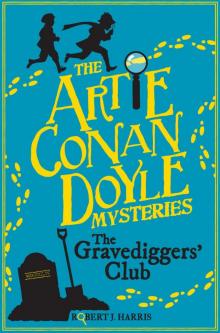 Artie Conan Doyle and the Gravediggers' Club
Artie Conan Doyle and the Gravediggers' Club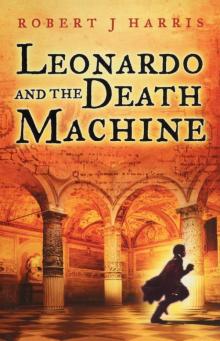 Leonardo and the Death Machine
Leonardo and the Death Machine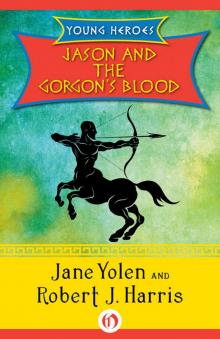 Jason and the Gorgon's Blood
Jason and the Gorgon's Blood Will Shakespeare and the Pirate's Fire
Will Shakespeare and the Pirate's Fire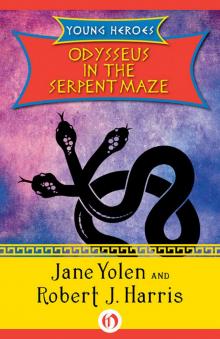 Odysseus in the Serpent Maze
Odysseus in the Serpent Maze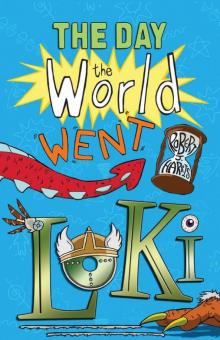 The Day the World Went Loki
The Day the World Went Loki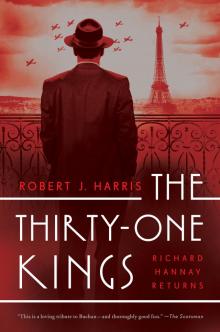 The Thirty-One Kings
The Thirty-One Kings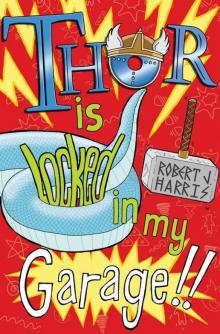 Thor Is Locked in My Garage!
Thor Is Locked in My Garage!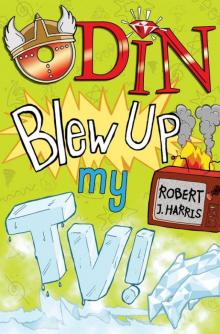 Odin Blew Up My TV!
Odin Blew Up My TV!